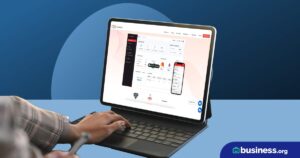💸 See if your business qualifies for a tax credit worth up to $26k per employee. 📞 Call Now: 855-979-9597
QuickBooks Commerce Review 2023
Data as of 12/20/22. Offers and availability may vary by location and are subject to change.
We are committed to sharing unbiased reviews. Some of the links on our site are from our partners who compensate us. Read our editorial guidelines and advertising disclosure.
QuickBooks is one of the best accounting and inventory management platforms on the market—in fact, it’s our preferred partner for accounting. So when QuickBooks bought TradeGecko and merged the platforms into QuickBooks Commerce, we just had to see if it was worth it.
QuickBooks Commerce is best for online sellers
QuickBooks Commerce is based on the QuickBooks accounting system and has been expanded for ecommerce sales. With the ability to track multichannel sales orders, QuickBooks Commerce takes the guesswork out of your business. Plus, with QuickBooks Online, all of your accounting is easily connected, so you know how much you’re spending and making each month.
This is not a perfect system, though. QuickBooks Commerce does limit products and monthly sales orders and requires QuickBooks accounting software, so if you prefer something else, you’re out of luck. But we think it does a good job of providing inventory management and ecommerce assistance without breaking the bank. Starting at just $50 per month you get QuickBooks Commerce and QuickBooks Online.
Of course, you’ll need to connect your ecommerce site first. (QuickBooks Commerce is not an ecommerce platform and requires you to connect an online store.) But then, with the power of QuickBooks behind it, you can fulfill orders in a breeze. Plus, QuickBooks Commerce lets you sell online and in a brick-and-mortar store. So you get the best of both worlds.
By signing up I agree to the Terms of Use and Privacy Policy.
QuickBooks Commerce plans and pricing
QuickBooks Commerce is made for small businesses with the price point to match. It prioritizes customers, fulfillment, and multiple sales channels so you can sell anywhere online. Plus, it’s a lot more affordable than almost every other inventory management system on the market.
QuickBooks Commerce is also less expensive than TradeGecko was, but it also has fewer options. TradeGecko had five plans ranging from $39 per month to $799 per month, and QuickBooks Commerce offers just one plan that includes all of the basic features from inventory management to accounting updates.
QuickBooks Commerce plans and pricing for 2023
Data as of 12/20/22. Offers and availability may vary by location and are subject to change.
º User limits are based on QuickBooks Online pairing
Since Intuit acquired TradeGecko in 2020 and turned it into QuickBooks Commerce, the commerce side is not a standalone product.1 QuickBooks Commerce requires a QuickBooks Online subscription, which adds to your monthly cost but does open a world of options.
QuickBooks Online plans and pricing for 2023
Data as of 12/20/22. Offers and availability may vary by location and are subject to change.
Starting at $27.50 per month with the current special offer, QuickBooks Commerce is a fantastic deal that offers inventory and order management plus accounting in one platform. Yes, it’s annoying to have to pay for two systems just to get the features you want, but again, QuickBooks is Business.org’s preferred accounting partner and a great deal. You just have to determine which QuickBooks Online plan is right for you. (We have a guide to help.)
QuickBooks Online—and QuickBooks Commerce—are 50% off for the first three months. So instead of paying $50 per month for QuickBooks Commerce and $55 for QuickBooks Online Essentials, it's $52.50 per month total.
QuickBooks Commerce key features
We think that QuickBooks Commerce is best for online sellers because it offers over 30 integrations to help you grow your business and prioritizes integrations to help you grow your business—including these three areas:
- Multichannel sales
- Income and expense tracking
- Wholesale B2B sales
However, since we’re discussing key features, you should know that QuickBooks’ website specifies that the software "may not work for everyone" because it does not offer dropshipping, serial number tracking, or custom products. If those are deal breakers for your business, you should look at other inventory management options.
Let’s dive into what QuickBooks Commerce offers . . .
Order management
QuickBooks Commerce is built for small online businesses. Its order management software allows you to stay connected across your sales channels with inventory updates for each sale. Because you can track your inventory and orders in one location, you’ll be able to stay on top of what you need to fulfill orders.
There is a downside: you have to primarily sell online and have fewer than 20,000 SKUs and 30,000 orders per month. This does limit the small businesses that can use QuickBooks Commerce.
Multichannel selling
Nowadays, many businesses are selling to customers on multiple platforms, including Etsy and Facebook Marketplace. With QuickBooks Commerce, you can connect those platforms so your inventory and sales numbers are kept up to date.
Having all of your business’s sales and inventory information in one place is key for businesses that operate multiple online storefronts. And it makes your life easier as a small-business owner. Plus, all of your sales data can be transferred to QuickBooks Online for automatic bookkeeping, so that’s one less thing you need to worry about.
Income and expense tracking with QuickBooks Online
QuickBooks Commerce is unparalleled in its accounting features because it’s built out of QuickBooks Online software. While most other inventory management brands have to integrate with accounting software, QuickBooks Commerce lets you track income and expenses and run account reports at the click of a button.
It doesn’t hurt that QuickBooks Online is our preferred partner, and our accounting expert thinks that it’s “one of the most versatile, user-friendly, and fully featured online accounting software products for small-business owners.”
Wholesale B2B sales
If you want to sell bulk online, you can create a wholesale B2B store through QuickBooks Commerce. You’ll get a custom domain, and the site can be password-protected and tailored to your customers. Setup is also super intuitive—you can use your branding, custom price lists, and take orders directly from the site without the need for a third party.
The best part? All of the sales still go through QuickBooks Commerce so you can track all of your sales channels in one place.
Integrations
QuickBooks Commerce currently has 32 integrations, and while that may not seem like a lot, they cover most users' needs. Since you need to have an ecommerce store up and running to use QuickBooks Commerce, marketplace integrations like Amazon, Squarespace, eBay, WooCommerce, Etsy, and Shopify allow you to bring in the data to run your store out of the QuickBooks platform.
QuickBooks Commerce integrations add to the platform, but they’re not comprehensive by any means. Plus, it speaks volumes that the best platform integration is not an integration at all: QuickBooks Online for accounting.
Compare QuickBooks Commerce vs. competitors
Data as of 12/20/22. Offers and availability may vary by location and are subject to change.
* With annual billing
º With special offer
The takeaway
QuickBooks Commerce is a good, sturdy inventory management platform. It gets the job done and allows you to manage sales and inventory across multiple sales channels. The big thing that sets it apart from other platforms is its low price (starting at $55 per month) and its home in QuickBooks Online.
If you’re searching for an easier way to track inventory, orders, and your accounts, then go with QuickBooks Commerce, where it’s all in one place. For businesses selling online with less than 20,000 products and under 30,000 orders a month, it’s a great system to help you run your business.
If you’re wondering what we think of QuickBooks as accounting software for your business, check out our review.
QuickBooks Commerce is the online selling and inventory management platform from Intuit QuickBooks. It was built out of TradeGecko and is now sold as a QuickBooks add-on platform. It provides inventory management, multichannel selling, and accounting synchronizations to small-business customers.
We spoke with a QuickBooks sales representative who told us, “Quickbooks Commerce is certainly here to stay!” There are definitely some confusing articles online, but those are referring to the sunsetting of TradeGecko, which was the precursor to QuickBooks Commerce. So if you’re looking to invest in QuickBooks’ inventory management software, QuickBooks Commerce is here for you for the foreseeable future.
Is QuickBooks Commerce the same as QuickBooks Desktop?
No, it’s not, but QuickBooks Commerce does require a subscription to QuickBooks Online. QuickBooks Desktop, on the other hand, was discontinued on May 31, 2022. Although QuickBooks Desktop does include inventory tracking features, it is not the same as QuickBooks Commerce.
Is TradeGecko now QuickBooks?
Yes! Intuit acquired TradeGecko in 2020 and transformed the brand into QuickBooks Commerce.1 The TradeGecko platform has been sunsetted, and now there is only QuickBooks Commerce.
Methodology
We spent 20 hours combing through QuickBooks Commerce, talking to sales representatives, watching walkthroughs, and comparing the platform to other inventory management brands. Our star ranking is based on pricing, features, integrations, and usability of the platform. Since QuickBooks Commerce is connected to QuickBooks Online, we also examined that platform to see if its a worthwhile partner for inventory management users.
Disclaimer
At Business.org, our research is meant to offer general product and service recommendations. We don't guarantee that our suggestions will work best for each individual or business, so consider your unique needs when choosing products and services.
Sources
- Intuit, “Intuit QuickBooks Adds Omni-Channel Commerce Capabilities by Acquiring TradeGecko,” August 3, 2020. Accessed December 20, 2022.










